Search engine optimization is always important, but if your primary marketing is in China, you have several hurdles to overcome, not the least of which is knowing how to handle SEO on China’s most popular search engine, Baidu.
SEO tactics, algorithms, and regulations for Baidu can be a lot different than those for Google. Additionally, China has national laws and regulations that must be followed.
In this article, we’ll show you how to get started with SEO in China as well as XX tips for Baidu SEO that you can use to get your business noticed online.
Getting Started With SEO in China
China is an enormous online market. As of June 2019, 854 million Chinese citizens were online, more than half of the country’s population. As more and more people in China get online, Baidu SEO strategies become even more important.
But China is a complicated online market with obstacles like censorship, bureaucracy, and language to contend with.
If you want to get your content in front of your target market in China, it’s best to use a local Chinese search engine like Baidu, not Google.
Baidu is known as the Google of China, and claims about 70% of the search engine market. In fact, Baidu’s slogan is “有事搜一搜,没事看一看,” or “Search in Need, Browse in Leisure.”
With Baidu’s popularity in China, the best way to optimize your SEO for the Chinese market is to focus on optimizing for Baidu SEO.
SEO in China: Tips for Baidu SEO
There are several key differences between Google and Baidu, but on-page optimization tactics do have some similarities. For instance, both search engines reward websites with unique content and keyword-rich meta tags.
We’re not planning to get deep into the differences between Google and Baidu in this article. Our goal with this article is to share tips you can use to improve your Baidu rankings.
However, there are a couple of differences between Google and Baidu that we want to point out before we dive into our tips for Baidu SEO. By paying attention to these differences, you’ll be able to navigate the complicated Chinese online market.
For starters, Baidu and Google differ in the importance given to on-page ranking factors. Baidu places a lot of importance on how well you use keywords in meta titles, meta descriptions, image alt-text, and anchor text.
Google, on the other hand, values content quality along with meta tags for rankings.
Because of this, Baidu’s search algorithm is often viewed as less-sophisticated than the algorithm Google uses.
Beyond the on-page SEO factors, Baidu uses other factors that are specific to Baidu and the Chinese market.
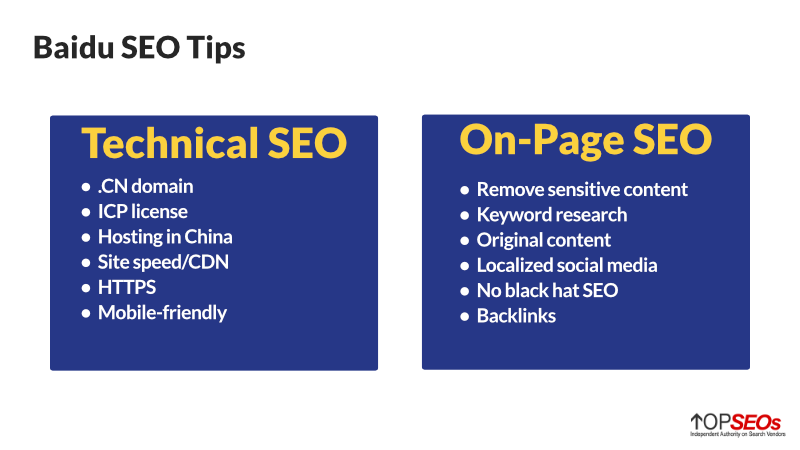
Rather than take a deep dive into the differences between Google and Baidu, let’s take a look at some tips for Baidu SEO that you can use to improve your website’s performance.
1. Use a .CN Domain
Baidu heavily favors sites hosted in mainland China with a .cn domain. This doesn’t mean that you can’t get a .com or .net site ranked, but you’re going to have much better luck with a .cn domain.
You can also use .cn subdomains or generic top-level domains with a subdomain, too.
2. Get an ICP License
All websites hosted on a server on mainland China have to have an Internet Content Publishing (ICP) license. Ranking well on Baidu is nearly impossible without one.
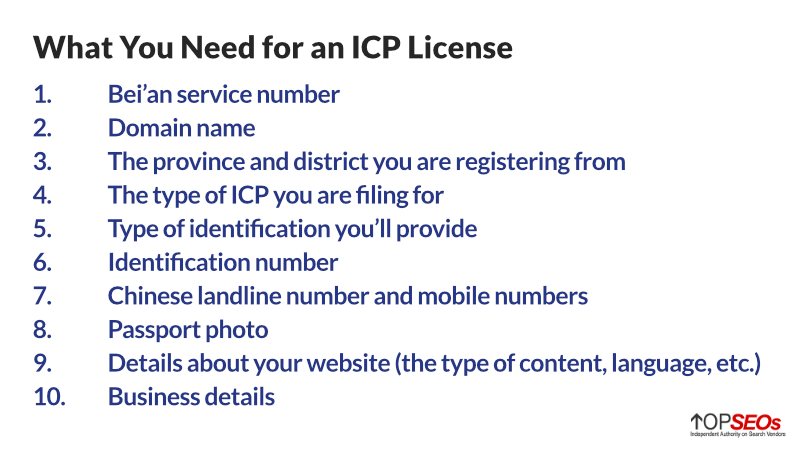
To get your ICP license, you need to register on the Aliyun ICP Management System and fill out a pretty in-depth application that includes:
- Bei’an service number
- Domain name
- The province and district you are registering from
- The type of ICP you are filing for
- Type of identification you’ll provide
- Identification number
- Chinese landline number and mobile numbers
- Passport photo
- Details about your website (the type of content, language, etc.)
- Business details
Yes, it’s quite a lengthy application, but remember that you’ll have a hard time ranking on Baidu if you don’t have it.
3. Use Only Mandarin Language
All site copy, SEO resources, and meta tags are required to be in Mandarin, preferably using Simplified Chinese characters.
This is not a job for Google Translate. Baidu can recognize poorly translated sites and might penalize you for it.
4. Use HTTPS, Not HTTP
Like Google, Baidu is now prioritizing HTTPS pages over HTTP pages. There are many sites on Baidu that haven’t made this switch, but it’s not optional.
Since you’re just getting started with Chinese SEO, start with HTTPS and you won’t have to worry about making changes when they inevitably remove HTTP sites from their index.
5. Make It Mobile-Friendly
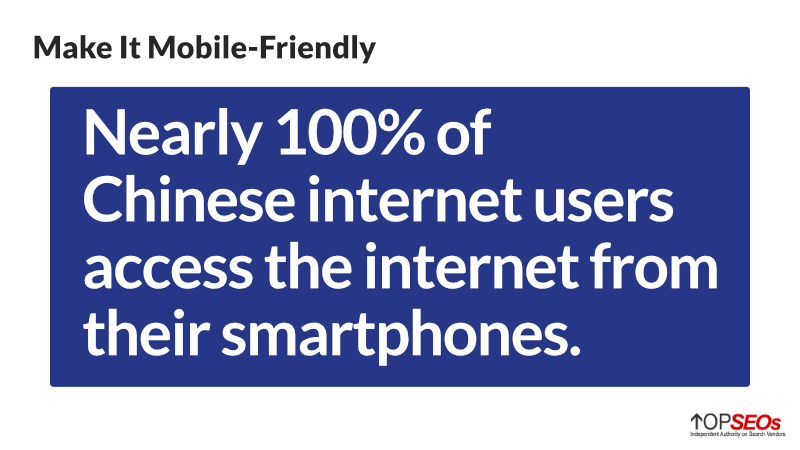
Nearly 100% of Chinese internet users access the internet from their smartphones. This is a big reason why sites that aren’t mobile-friendly are given lower rankings. Sites that aren’t mobile-optimized will also have higher bounce rates from mobile users, resulting in even lower rankings.
We strongly encourage you to create a mobile version of your site that includes vital information at the top of the page and reduces scrolling and clicking.
To make sure that your site is not only mobile-friendly but designed with your Chinese audience in mind, check out this list of the best web design companies in China. They can help you create a website that’s ready for Baidu and other Chinese search engines.
6. Use a CDN
Site speed is vital to keeping visitors from leaving your page. If your site takes more than 3 seconds to load, you’re going to lose more than half of your traffic.
Thanks to the sheer size of China, as well as the so-called Great Firewall of China (legislative actions and technologies used to regulate the internet in China), we recommend that you use a CDN (content delivery network) to improve your site speed.
A CDN lets visitors get data from the closest available server instead of the main server where the site is hosted. This greatly improves site load speed and increases the speed at which visitors can access the information on your site.
There are quite a few CDNs available, but you’ll want to make sure to choose a CDN with servers in mainland China. Cloudflare is a CDN that not only has an extensive server network in mainland China but also has a partnership with Baidu.
7. Remove Blacklisted and Sensitive Content
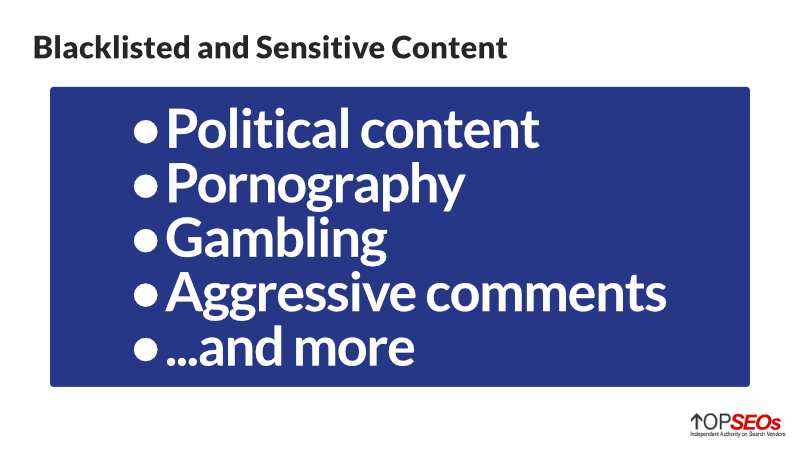
Before you even think about putting your site on a Chinese server, you’ll need to review your site’s content to make sure it doesn’t include anything that China has deemed to be sensitive content or blacklisted keywords.
This could be anything like political content, pornography, gambling, aggressive comments, and the like. Baidu will index your site as offensive and it will likely be shut down.
In addition to the content, you’ll need to take steps to ensure that your site is easily accessible by Baiduspider. This means using plain HTML instead of JavaScript, Flash, or iFrame.
And, even if your outbound links to non-Chinese sites are all above-board, content-wise, you’ll still want to replace those links with high-authority, relevant Chinese-based sites.
You can use Baidu’s Webmaster Tools to help you with the technical SEO that goes into this (sitemaps, identifying and fixing broken links, etc).
8. Do Keyword Research
Baidu requires a higher keyword density than other search engines (8%–12%), but that doesn’t mean keyword density is all you need to think about.
Content quality is still very important for Baidu’s ranking algorithm. Plus, the keywords you include must be relevant to your content and used naturally (no keyword stuffing).
There are several tools available to help you find the right keywords. Here are our picks for the best keyword research tools around.
9. Focus on Your Homepage
While Google looks at an overall website when considering rankings, Baidu prioritizes the homepage of a site more than the other pages. That’s why building a beautiful homepage should be your top priority.
10. Create Original High-Quality Content
As of September 2018, Baidu released the Hurricane 2.0 update to their algorithm. This update made it clear that Chinese search engines would be paying much more attention to content quality than they had in the past.
Since the Hurricane 2.0 update, websites found to have duplicate content or content with poor relevance to the rest of the site were penalized. If they got caught twice, the sites could even be banned forever.
To make sure that you’re including the best possible content, you’ll want to make sure that your content is free from grammatical errors and misspellings, as well as high-quality video and images.
This is why it’s so important to hire a native Chinese writer to handle your content.
Even though Google is still more advanced, Baidu has become better at identifying quality content.
11. Include Localized Social Media Platforms
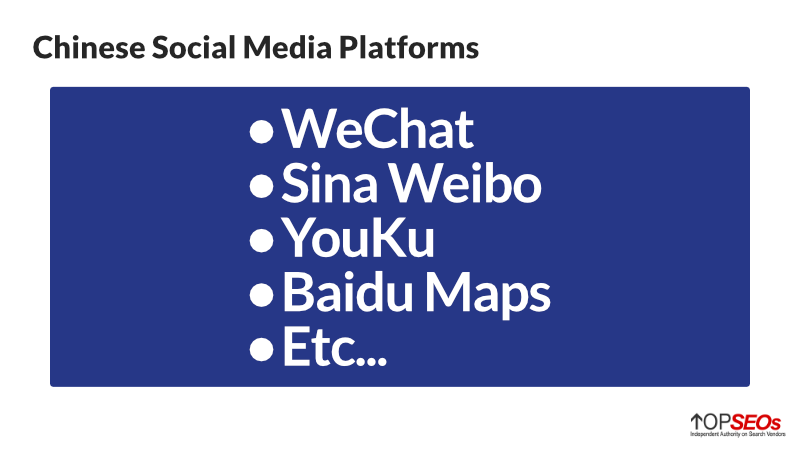
When you’re reworking your website and landing pages for Chinese markets, don’t forget to replace links to social media platforms like Facebook, Twitter, Instagram, and even Google Maps with their Chinese equivalents (WeChat, Sina Weibo, YouKu, Baidu Maps, Douyin, etc).
If you use embedded video on your site from either YouTube or Vimeo, that content will need to be added to YouKu (China’s equivalent of YouTube) or another Chinese video hosting site.
Have a look at this article for more information about how social media and SEO work together.
12. Use Baidu Webmaster Tools
We briefly mentioned Baidu’s Webmaster Tools earlier, but the tools are really helpful and warrant their own section.
You can use Baidu’s tools to get yourself a Chinese web presence before your site is even ready by creating a Baidu Baike page (similar to Wikipedia). Verified Baidu Baike pages will show up if users search for your company, regardless of whether or not you have an official website.
Baidu Webmaster Tools are only available in Chinese.
13. Avoid Keyword Stuffing and Other Black Hat SEO Tactics
The days of Baidu ignoring black hat SEO tactics are gone. With the Thunder update, Baidu began penalizing severely sites caught using black hat SEO tactics.
So, what counts as black hat SEO for Baidu? Pretty much the same tactics that Google considers unethical, like keyword stuffing or link/traffic cheating:
-
Embedding cheating content into a website to get traffic or steal user information
-
Copying another company’s official website or not providing security guarantees for transactions
-
Using BSP, BBS, or classified information sites to release fake customer service numbers with the intention to defraud users
-
Sending mass messages via Web2.0 channels of BSP and BBS sites with meaningless content in an effort to lead users to download malicious programs
As you can see, Baidu takes black hat SEO seriously, so it’s in your best interest to stick to accepted practices (and don’t end up banned from Baidu forever).
We recommend focusing on your audience and creating content for them that’s optimized for search engines, instead of writing for search engines.
14. Get More Backlinks
Backlinks are an important part of an SEO strategy, and that still applies to Baidu. Links on Baidu help establish a site’s authority as they do on Google, but they also help enforce Chinese censorship laws.
Website authority is an important ranking factor on Baidu, just as it is on Google. Some websites like Zhihu (知乎) are deemed high-authority sites and their content shows up on the first couple of pages of Baidu search results because of that.
Interestingly, the authority for Zhihu seems to come mostly from backlinks.
An important thing to remember when creating your web presence in China is that you can be penalized for linking to any sensitive or blacklisted content, even if your site doesn’t contain any. Pay particular attention to where your site is linking to.
Want to make sure that your link building efforts make sense for the Chinese marketing? Here’s a list of the best link building companies in China that can help you out.
Wrapping Up
China is an enormous online market with millions of users searching for your content. The most important thing you can do to get indexed and noticed is to create high-quality content just as you would for sites indexed on Google.
By focusing on creating solid content and following the rest of these tips for Baidu SEO, you’ll be well on your way to enjoying the rankings and traffic from your target Chinese audience.
SEO in China has a lot of moving parts. If you’re not familiar with it, you could do some serious damage to your site’s reputation, maybe even getting banned from Baidu permanently.
To make sure that doesn’t happen, check out this list of the best SEO services in China. These SEO agencies can make sure that the SEO for your Chinese site is on point.




















